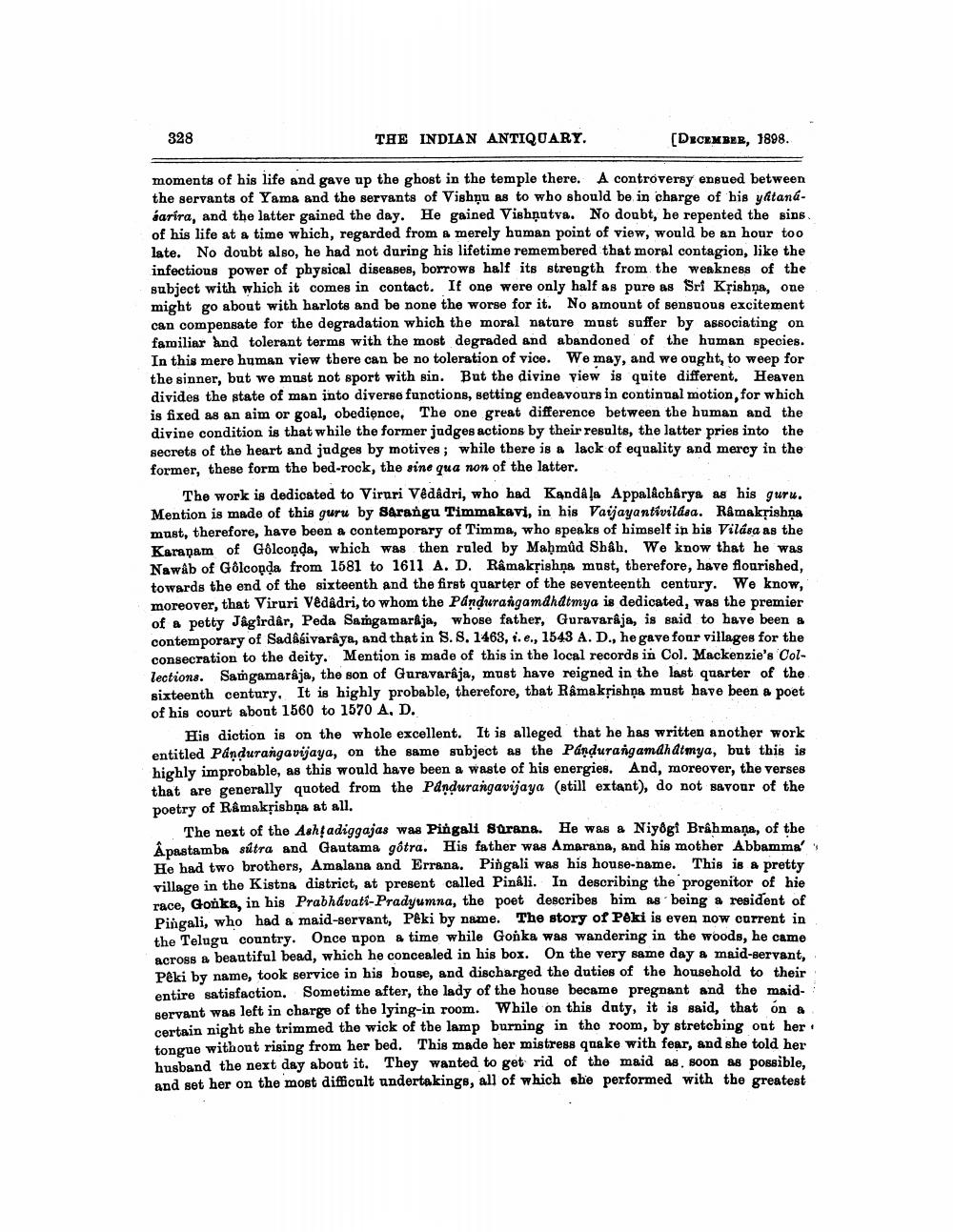________________
328
THE INDIAN ANTIQUARY.
[DECEMBER, 1898.
moments of his life and gave up the ghost in the temple there. A controversy ensued between the servants of Yama and the servants of Vishnu as to who should be in charge of his yatanááarira, and the latter gained the day. He gained Vishnutva. No doubt, he repented the sins. of his life at a time which, regarded from a merely human point of view, would be an hour too late. No doubt also, he had not during his lifetime remembered that moral contagion, like the infectious power of physical diseases, borrows half its strength from the weakness of the subject with which it comes in contact. If one were only half as pure as Sri Krishna, one might go about with harlots and be none the worse for it. No amount of sensuous excitement can compensate for the degradation which the moral nature must suffer by associating on familiar and tolerant terms with the most degraded and abandoned of the human species. In this mere human view there can be no toleration of vice. We may, and we ought, to weep for the sinner, but we must not sport with sin. But the divine view is quite different. Heaven divides the state of man into diverse functions, setting endeavours in continual motion, for which is fixed as an aim or goal, obedience, The one great difference between the human and the divine condition is that while the former judges actions by their results, the latter pries into the secrets of the heart and judges by motives; while there is a lack of equality and mercy in the former, these form the bed-rock, the sine qua non of the latter.
The work is dedicated to Viruri Vêdâdri, who had Kandala Appalâchârya as his guru. Mention is made of this guru by Sarangu Timmakavi, in his Vaijayantivilása. Ramakrishna must, therefore, have been a contemporary of Timma, who speaks of himself in his Vilása as the Karanam of Golconda, which was then ruled by Mahmûd Shâh. We know that he was Nawab of Golconda from 1581 to 1611 A. D. Ramakrishna must, therefore, have flourished, towards the end of the sixteenth and the first quarter of the seventeenth century. We know, 1 moreover, that Viruri Vêdâdri, to whom the Pandurangamahatmya is dedicated, was the premier of a petty Jagirdâr, Peda Samgamaraja, whose father, Guravaraja, is said to have been a contemporary of Sadasivaraya, and that in S. S. 1463, i. e., 1543 A. D., he gave four villages for the consecration to the deity. Mention is made of this in the local records in Col. Mackenzie's Collections. Samgamaraja, the son of Guravaraja, must have reigned in the last quarter of the sixteenth century. It is highly probable, therefore, that Ramakrishna must have been a poet of his court about 1560 to 1570 A. D.
His diction is on the whole excellent. It is alleged that he has written another work entitled Pandurangavijaya, on the same subject as the Pandurangamahatmya, but this is highly improbable, as this would have been a waste of his energies. And, moreover, the verses that are generally quoted from the Pandurangavijaya (still extant), do not savour of the poetry of Ramakrishna at all.
The next of the Ashtadiggajas was Pingali Surana. He was a Niyogi Brahmana, of the Apastamba sútra and Gautama gôtra. His father was Amarana, and his mother Abbamma He had two brothers, Amalana and Errana. Pingali was his house-name. This is a pretty village in the Kistna district, at present called Pinâli. In describing the progenitor of hie race, Gonka, in his Prabhávati-Pradyumna, the poet describes him as being a resident of Pingali, who had a maid-servant, Pêki by name. The story of Peki is even now current in the Telugu country. Once upon a time while Gonka was wandering in the woods, he came across a beautiful bead, which he concealed in his box. On the very same day a maid-servant, Pêki by name, took service in his house, and discharged the duties of the household to their entire satisfaction. Sometime after, the lady of the house became pregnant and the maidservant was left in charge of the lying-in room. While on this duty, it is said, that on a certain night she trimmed the wick of the lamp burning in the room, by stretching out her tongue without rising from her bed. This made her mistress quake with fear, and she told her husband the next day about it. They wanted to get rid of the maid as, soon as possible, and set her on the most difficult undertakings, all of which she performed with the greatest




